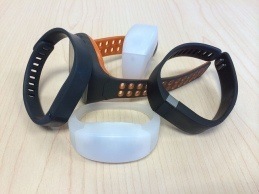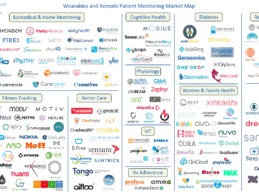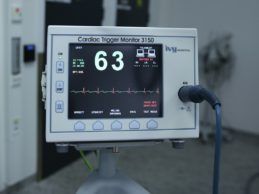Personalized Analytics is becoming essential in healthcare, stemming from the movement from fee-for-service to a value-based market. The need to preempt and prevent disease on a more personal level, rather than merely reacting to symptoms, has created a significant opportunity for machine learning-based applications. This “analytics of one” approach (using advanced mathematical models and artificial intelligence techniques) is already impacting several key areas:
1. Medical imaging is utilizing
Read More
Wearables | Trackers | Smartwatches | News, Analysis, Insights
What’s the Difference: A Look at Consumer and Medical-Grade Wearables in Healthcare
Can both consumer and medical-grade wearables work together to fill healthcare’s care gaps? Dr. Sunil Kapur shares his insights.
What does Abbott’s Confirm Rx insertable cardiac monitor (ICM) and the latest Apple Watch have in common? The answer: more than you think, and perhaps not nearly enough. Today, consumer and medical-grade wearables may live in different markets, but they are aligning on a similar long-term objective—capturing critical data to improve outcomes.
“People want to
Read More
Consumers Willing to Utilize Medical Wearables to Avoid Physician Visits
Consumers are willing to utilize medical wearables to overcome barriers to seeing a physician, including distance and cost, according to a recent survey by VivaLNK. The survey reveals that of 100 participants ages 40 and over, 64 percent said they would utilize a wearable health monitoring device if it meant it could reduce the number of times, they had to physically visit a doctor or hospital.3 Factors Driving Patient’s Desire to Reduce Physical Physician AppointmentsThe survey determined there
Read More
Reaching the Healthcare Mainstream: Wearables and Remote Patient Monitoring Market Map
Even though 2014 was supposed to be the “year of the wearable” according to Forbes, five years later we are now seeing the wearable reach maturity and mass-adoption. This increase in adoption has largely been driven by software and hardware stability which is now allowing these devices to be used with confidence to manage an individual’s health and wellness, including chronic condition management. The graphic below from Accenture shows the increase in technology usage across consumers to manage
Read More
Study: Fitbit Devices Could Predict Inflammatory Bowel Disease (IBD) Flare-Ups
Fitbit devices could help predict the flare-ups of inflammatory bowel disease (IBD), including Crohn’s disease and ulcerative colitis, according to a new study published in the Journal of Crohn's and Colitis. The year-long study, which was recently presented at Digestive Disease Week, was conducted by the University of Chicago.Impact of IBD Flare-UpsEven when managed well, IBD can flare up or cause symptoms unexpectedly, which may be triggered by diet, stress, and physical activity (or lack
Read More
3 Major Problems With the Medical Device and Wearables Market in 2019
Technology can improve human life in significant ways and aid in the fight against troublesome illnesses. Unfortunately, no technology is perfect — and newer technologies are especially prone to growing pains.There are three major problems in today's medical devices and wearables market: potential sabotage of the devices themselves, devices as a backdoor into networks and patient data, and device manufacturers taking advantage of regulatory loopholes to get their products on the market.1. Many
Read More
How Consumer Technology is Influencing Healthcare Innovation
When it comes to healthcare, we look to physicians, nurses, and specialists and trust them to be the experts when it comes to our health, but we don’t typically look to them to be technology experts. In fact, the healthcare industry, especially the back office, has been historically slow to adopt new technology, relying on paper records and pagers, fax machines and even hand delivery of files and records. Many clinics are not equipped to digitally connect to another office’s patient records.
Read More
Validic Integrates With Welldoc’s Bluestar Platform to Enable Real-Time Insights for Patients
Validic, a provider of data solutions for remote monitoring and virtual engagement is integrating with Welldoc’s BlueStar platform. The integration of personal health data within the Welldoc BlueStar digital therapeutic platform will allow users to connect their wearables, apps, and in-home health devices directly to the platform – enabling deeper engagement and better self-management of one's health.The Power of Leveraging Device-Generated Data for PatientsAs the number of people managing
Read More
Cardiogram’s Wearable Based Monitoring Tool Is Now Covered by Oscar
Cardiogram is a digital health company announced that it's wearable-based monitoring for atrial fibrillation and diabetes is now covered by Oscar Health Insurance, without paying out of pocket. The coverage will help provide end-to-end preventive care: continuous wearable monitoring, convenient testing, contextualized results, and clinical triage.Impact of Chronic ConditionsFor chronic conditions like diabetes, atrial fibrillation, hypertension, and sleep apnea, anywhere between 20–80% of cases
Read More
What The Failure of Microsoft’s HealthVault Means for the Future of EHRs
Microsoft recently announced that it is officially shutting down HealthVault at the end of this year. HealthVault was Microsoft’s attempt at a web-based personal health record system. You probably never used it -- it suffered low adoption. But while HealthVault will shut down, mobile apps that collect and store your personal health information and share it with your healthcare team are poised to revolutionize medicine and wellness practice.
The downfalls of HealthVault included its focus on
Read More









